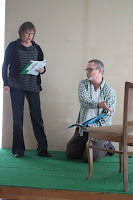Holy Playfulness
One does not usually think of play when it comes to church.
At least for adults, that is. Children are allowed to play in the nursery. If
you are in a large enough congregation that is lucky enough to have a gym, then
one can play basketball. Many Episcopal churches use Godly Play for children’s
church. That is where children learn Bible stories Montessori style by playing
with wooden figures representing Biblical characters. But for adults, church is
serious business, certainly nothing to play around with. Churches take adult
education, evangelism, stewardship, and worship very seriously. It doesn’t matter if it is liturgical,
evangelical, or charismatic; church is serious business.
For humans, though, play is very important. Play is part of
our human nature. Pretty much all mammals play. Think of cats, dogs, otters,
even elephants! Turn into any animal show and you will see them playing. It’s
not just our animal nature that comes out in play. Studies show that higher
level cognitive abilities, like math and reading, are built upon our experience
of being able to play. Teamwork and cooperation grow out of play. Our ability
to collaborate and to create grow out of our ability to play with one another.
Play is also part of our theology. We are created in the
image of God and God is playful. Again, a hard concept for many to grasp. What
do you mean God is playful? The God of vengeance? The God who judges our sins
and punishes the wicked? Yeah, that God. The God who created the frolicking
puppies and the flitting fish in the sea. The God who played with all the
colors of the rainbow to create elaborate flora and fauna just for the fun of
it. Why would God create fluttering butterflies if not to play with? Even our
earth and all that is on it was part of God’s playful plan. God didn’t need
us, God wanted us. God wanted something to love, to delight in. Dr. Scott
Eberle in The Elements of Play identified six elements of play:
anticipation, surprise, pleasure, understanding, strength, and poise. To me,
those make me think about how God loves His children.
If we believe that our need for play is God-given, then
shouldn’t play be allowed in church? I’m talking about more than the church
softball league or the Sunday afternoon social on the lawn. I’m asking why we
can’t incorporate play into everything we do at church? If science has proved that
we learn better through play, then let’s start playing. And if you don’t
believe the science, then believe Mary Poppins, “In every job that must be done,
there is an element of fun. You find the fun and snap! The job's a game.” So,
let’s bring some playfulness to our worship. Even if it’s High-Church,
Anglo-Catholic, it can still be playful. Playful doesn’t mean disrespectful, it
means lighten up! It means don’t take yourself so seriously that the altar
guild, servers, and musicians leave worship with ulcers. It’s not just worship.
It wouldn’t hurt to bring some play to the committee and vestry meetings. In Life
Unscripted: Using Improv Principles to Get Unstuck, Boost Confidence, and
Transform Your Life, Katzman and O’Connor wrote, “What if the
predominant emotional experience in the workplace (church) was one of
play, rather than trepidation, perfectionism, or competition?” Those of you who
have ever served on a church committee can understand that.
The Church that plays together, stays together. Play breaks
down barriers that can separate us. When we play, we engage, open up, and
share. We leave behind our differences and enjoy one another. We become a team,
not individuals seeking our own way. Changing the culture of a parish to one of
playfulness doesn’t happen on its own. It takes time and effort. You have to
work on it. The very first step is choosing to change the culture. Be
intentional. Don’t give up. When you fail, try again. Church can be a play of
joy and playfulness as well as of reverence and awe.




Comments
Post a Comment